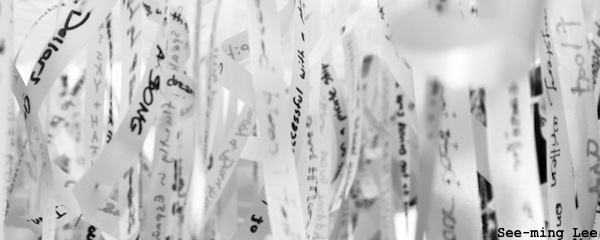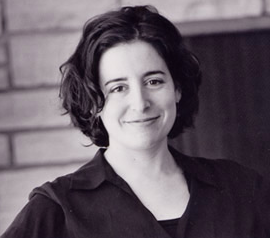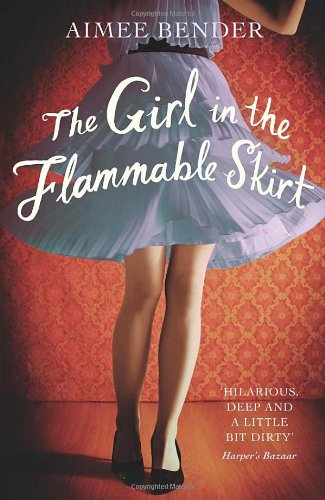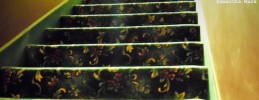
photo by See-ming Lee
by Debbie Kinsey
I can’t tell you exactly what I’m looking for, but I’ll know it when it happens. I want to be breathless and weak, crumpled by the entrance of another person inside my soul. I want to be violated by insight.
~ from ‘Call My Name’, in The Girl in the Flammable Skirt
Aimee Bender is a writer who turns the ordinary into the extraordinary, and vice versa. Her stories include a boy with keys for fingers, a girl whose hand is made from ice, and a man going through reverse evolution. Her prose has been called ‘moving, fanciful and gorgeously strange’ by People Magazine, and the San Francisco Chronicle say that her stories ‘[float] in the ethereal space between naturalism and magic realism’.
As well as two novels – An Invisible Sign of My Own and The Particular Sadness of Lemon Cake – Bender has written three short story collections. The first, Willful Creatures, was a New York Times ‘Notable Book’, The Girl in the Flammable Skirt was nominated by The Believer as one of the  Best Books of the Year, and her newest collection, The Color Master: Stories, was published in August 2013 to great acclaim. She has been awarded two Pushcart prizes, and has been nominated for many awards, including the TipTree Award and the Shirley Jackson Short Story Award. While numerous literary magazines have published her works, from Granta to The Coffin Factory to Tin House.
Best Books of the Year, and her newest collection, The Color Master: Stories, was published in August 2013 to great acclaim. She has been awarded two Pushcart prizes, and has been nominated for many awards, including the TipTree Award and the Shirley Jackson Short Story Award. While numerous literary magazines have published her works, from Granta to The Coffin Factory to Tin House.
Bender’s stories are truly fairytale-like, answering ‘what if’ questions with an unexpected, sometimes dark outcome. She often uses metaphor and surreal or strange elements as a way of indirectly writing about relationships and emotions. In an interview with LitReactor, she said that she prefers this style of writing as a reader too:
I like metaphor and I like strangeness as a way into emotion. It’s just something I respond to very viscerally […] the surprise for me was that people responded better to that than my faked-out, tricked-up realistic fiction.
However, her metaphors are not always easy or obvious, and, like Haruki Murakami, she likes to leave gaps for the reader to fill.
It is these empty spaces you have to watch out for, as they flood up with feeling before you even realize what’s happened. ~ from ‘The Meeting’, in Willful Creatures
Her stories are, in a literal sense, a discovery for Bender as well as the reader. She never plans or plots in advance and enjoys surprising herself with what she finds. She told Goodreads that she wants her readers to have an experience when they read her stories, one that stays with them, and that doesn’t necessarily have to be scrutinized for specific meaning. In this way, her writing is very inclusive. If the story works, it’s okay to read it and simply feel. As well as authors such as Murakami, Marilynne Robinson and the Brothers Grimm, Bender has cited both her psychiatrist father and choreographer mother as influences on her work. The use of metaphor and exploration of the unconscious are prominent elements in both creating dance and working with other people’s awareness. When speaking with Pif Magazine, she said she feels her writing brings both of her parents’ ways of working together:
I’m sort of the combo platter, in that psychiatry is so essentially verbal and [dance is] all about creating from this inexplicable mysterious place […] It seems the best work I do is when I am really allowing the unconscious to rule the page.
 But Bender didn’t start out writing this way. In an interview with writer Nik Perring, Bender said it took her some time to become comfortable writing the kind of fantastical stories that come most naturally to her. In graduate school she often handed in two stories for an assignment – one she felt she should be writing and one more magical or strange, which she much preferred. Once she found that her peers and teachers preferred those too, and that writing weird things was actually allowed and encouraged, she didn’t look back. Wonderfully, Perring has said that reading Bender helped him to give himself permission to ‘write weird’ in his own way, and he has gone on to publish two collections of his own. Bender currently teaches creative writing at the University of Southern California, where the course acts as a compliment to her writing. In Unstuck Literary Annual, she has spoken of her enjoyment of talking about writing and ideas, and the social aspect of teaching that you don’t get in the solitary profession of writing. Though it doesn’t directly inform her stories, she has said that her teaching keeps her honest in her writing, ensuring she practices the values she preaches. It is Bender’s unique view on the world that has been most influential to other writers, particularly new ones. She often gives interviews in blogs and magazines, helping to ensure that the next generation of writers give themselves permission to write what feels natural to them – regardless of what we should or shouldn’t be writing.
But Bender didn’t start out writing this way. In an interview with writer Nik Perring, Bender said it took her some time to become comfortable writing the kind of fantastical stories that come most naturally to her. In graduate school she often handed in two stories for an assignment – one she felt she should be writing and one more magical or strange, which she much preferred. Once she found that her peers and teachers preferred those too, and that writing weird things was actually allowed and encouraged, she didn’t look back. Wonderfully, Perring has said that reading Bender helped him to give himself permission to ‘write weird’ in his own way, and he has gone on to publish two collections of his own. Bender currently teaches creative writing at the University of Southern California, where the course acts as a compliment to her writing. In Unstuck Literary Annual, she has spoken of her enjoyment of talking about writing and ideas, and the social aspect of teaching that you don’t get in the solitary profession of writing. Though it doesn’t directly inform her stories, she has said that her teaching keeps her honest in her writing, ensuring she practices the values she preaches. It is Bender’s unique view on the world that has been most influential to other writers, particularly new ones. She often gives interviews in blogs and magazines, helping to ensure that the next generation of writers give themselves permission to write what feels natural to them – regardless of what we should or shouldn’t be writing.

